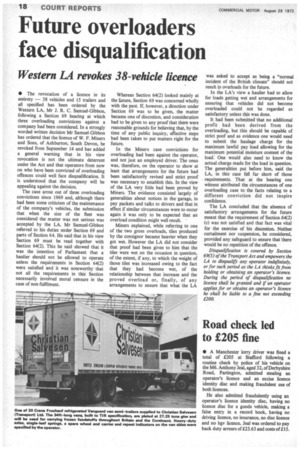Future overloaders face disqualification
Page 20

If you've noticed an error in this article please click here to report it so we can fix it.
Western IA revokes 38-vehicle licence
• The revocation of a licence in its entirety — 38 vehicles and 15 trailers and all specified has been ordered by the Western LA, Mr J. R. C. Samuel-Gibbon, following a Section 69 hearing at which three overloading convictions against a company had been considered. In a strongly worded written decision Mr Samuel-Gibbon has ordered that the licence of W. F. Miners and Sons, of Ashburton, South Devon, be revoked from September 14 and has added a general warning that in his view revocation is not the ultimate deterrent under the Act and that operators from now on who have been convicted of overloading offences could well face disqualification. It is understood that the company will be appealing against the decision.
The case arose out of three overloading convictions since 1969 and, although there had been some criticism of the maintenance of the company's vehicles, the submission that when the size of the fleet was considered the matter was not serious was accepted by the LA. Mr Samuel-Gibbon referred to his duties under Section 69 and parts of Section 64. He said that in his view Section 69 must be read together with Section 64(2). This he said showed that it was the intention of Parliament that a haulier should not be allowed to operate unless the requirements in Section 64(2) were satisfied and it was noteworthy that not all the requirements in this Section necessarily involved moral censure in the case of non-fulfilment. Whereas Section 64(2) looked mainly at the Cuture, Section 69 was concerned wholly with the past. If, however, a direction under Section 69 was to be given, the matter became one of discretion, and consideration had to be given to any proof that there were reasonable grounds for believing that, by the time of any public inquiry, effective steps had been taken to put matters right for the future.
In the Miners case convictions for overloading had been against the operator, and not just an employed driver. The onus was, therefore, on the operator to show at least that arrangements for the future had been satisfactorily revised and strict proof was necessary to establish this. In the view of the LA very little had been proved by Miners. The evidence consisted largely of generalities about notices in the garage, in pay packets and talks to drivers and that in effect if similar circumstances were to occur again it was only to be expected that an overload condition might well result.
Miners explained, while referring to one of the two gross overloads, tiles produced by the consignor became heavier when they got wet. However the LA did not consider that proof had been given to him that the tiles were wet on the occasion in question, of the extent, if any, to which the weight of those tiles was increased owing to the fact that they had become wet, of the relationship between that increase and the proved overload or, finally, of any arrangements to ensure that what the LA was asked to accept as being a "normal incident of the British climate" should not result in overloads for the future.
In the LA's view a haulier had to allow for loads getting wet and arrangements for ensuring that vehicles did not become overloaded could not be regarded as satisfactory unless this was done.
It had been submitted that no additional profit had been derived from the overloading, but this should be capable of strict poof and as evidence one would need to submit the haulage charge for the maximum lawful pay load allowing for the maximum potential moisture content of the load.' One would also need to know the actual. charge made for the load in question. The generalities put before him, said the LA, in this case fell far short of those requirements. That at the hearing one witness attributed the circumstances of one overloading case to the facts relating to a different conviction did not inspire confidence.
The LA concluded that the absence of satisfactory arrangements for the future meant that the requirement of Section. 64(2) (c) was not satisfied and that fact was vital for the exercise of his discretion. Neither curtailment nor suspension, he considered, provided any safeguard to ensure that there would be no repetition of the offence.
Disqualification is covered by Section 69(5) of the Transport Act and empowers the LA to disqualify any operator indefinitely, or for such period as the LA thinks fit from holding or obtaining an operator's licence. During the period of disqualification no licence shall be granted and r an operator applies for or obtains an operator's licence he shall be liable to a fine not exceeding
L 200.




















































































